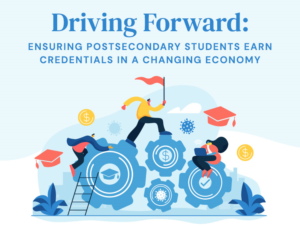
The COVID-19 pandemic and ensuing shutdowns caused severe disruption to education across the K-to-career continuum, with Tennessee’s colleges and universities shifting from in-person to exclusively online formats for more than 200,000 students. The state economy — strong at the outset of COVID-19 — dipped significantly in the months that followed. More than 640,000 Tennesseans filed for unemployment insurance and state revenue came up $12.5 million short of projections in the month of June.
These unprecedented shifts in postsecondary education and the state economy led the SCORE team to ask: What does this mean for high school seniors and current college students trying to get ahead in a competitive economy?
To answer that question, SCORE and the Boyd Center for Business and Economic Research at the University of Tennessee, Knoxville, partnered on a new digital report, Driving Forward: Ensuring Postsecondary Students Earn Credentials In A Changing Economy. The report examines the effects of the last two economic recessions on postsecondary education and the workforce in Tennessee, considers the COVID-19 context, and provides concrete policy recommendations that chart a path forward for policymakers and postsecondary leaders.
The evidence shared in Driving Forward underscores the importance of postsecondary education.
- A high-quality postsecondary credential matters now more than ever. More than half of Tennessee’s jobs require a postsecondary credential, but just 45 percent of Tennesseans have one. And the COVID-19 recession has had a clear effect on jobs and industry: unemployment claims continue, and are concentrated in manual, routine jobs that do not require postsecondary training. We know from previous recessions that college degree-holders are more likely to remain employed during hard economic times, so ensuring students have opportunity to access and succeed in college is important now as ever.
- Past economic downturns have resulted in students footing a larger portion of the tuition bill in the years that followed. State support for higher education often declines during an economic recession, making it difficult for colleges to sustain per-student funding levels without raising tuition.
The report notes the uncertain future of postsecondary education. The COVID-19 pandemic and economic recession has affected students, communities, and higher education as whole.
- Students face unique barriers to enrollment. As COVID-19 continues to spread, students and families face uncertainty about enrolling in college. Usually, economic recessions result in more student enrolling in college, but it is not yet clear that this will hold in current times.
- Higher education funding is vulnerable. Research shows that an institution’s financial health affects student completion rates – underscoring the importance of ensuring higher education funding is maintained.
- Online learning poses challenges. Social distancing requirements are moving colleges and universities to offer a larger share of online courses, which will require additional time and training.
With students facing increasing barriers to completion, the report offers a roadmap to guide our response.
Driving Forward offers several policy recommendations on how Tennessee can continue leading the way in higher education policy and innovation. From prioritizing higher education funding to coordinating our efforts on degree-completion, there are steps we can take now to support Tennessee students through these challenging economic times. A strong policy foundation and student-focused leaders will ensure that the roadmap to stability during these times — although unprecedented — sees postsecondary students earning credentials in a changing economy. We hope you’ll take the time to read this report and help us put this plan into action.
Bryce Warden is senior postsecondary policy analyst at SCORE.

